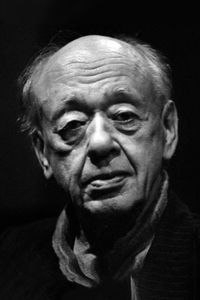Eugène Ionesco, a literary luminary of unparalleled repute, was a multifaceted individual who left an indelible mark on the world of theatre. Born in Romania, he would later make France his adopted home, where he would go on to pen a plethora of plays that would captivate audiences and critics alike.
As a playwright, Ionesco's creative output was characterized by its unique blend of absurdity, existentialism, and philosophical introspection. His works, often infused with a sense of humor and irony, would come to define the French avant-garde theatre movement of the 20th century, cementing his status as a leading figure in the realm of modern drama.
Eugène Ionesco's life commenced on November 26, 1909, in the quaint town of Slatina, Romania, where his existence was first breathed into being. The product of a union between a Romanian father who hailed from the Orthodox Christian church and a mother of mixed French and Romanian ancestry, who belonged to the Protestant faith, Ionesco's early life was marked by a unique cultural blend.
As a young boy, he was baptized into the Orthodox Christian tradition, a ritual that would later influence his artistic expression. However, his formative years were largely spent in France, where the country's rich cultural heritage and artistic landscape would shape his artistic sensibilities and lay the foundation for his future creative endeavors.
Eugène Ionesco's worldview underwent a profound transformation following a life-altering experience in France, where he was suddenly enveloped by an extraordinary sensation of radiant luminosity, as if he were floating effortlessly above the ground, and enveloped by an overwhelming sense of profound well-being.
This extraordinary encounter had a lasting impact on his creative output, as it influenced the tone and themes that would become hallmarks of his literary work. Specifically, it fueled his deep-seated disgust for the mundane, tangible world, and instilled in him a pervasive distrust of communication, as he began to perceive language as a flawed and inadequate tool for conveying the depths of human experience.
Moreover, this experience imbued him with a profound sense of longing for a world that lay just beyond the reach of our mundane reality, a world that was more authentic, more meaningful, and more fulfilling. This yearning would become a recurring motif in his work, as he sought to capture the essence of this elusive realm through his writing, often blurring the boundaries between reality and fantasy in the process.
Eugene Ionesco, a renowned playwright, often incorporated themes of longing and yearning into his works, frequently featuring characters who are captivated by an elusive and alluring "city of lights". This perceived world beyond their immediate surroundings serves as a metaphor for the characters' aspirations and desires, as they struggle to reconcile their ideals with the harsh realities of their existence.
Throughout his plays, Ionesco's characters frequently experience moments of ecstatic revelation, where they are suddenly struck by the beauty and wonder of the world around them. However, this sense of transcendence is often tempered by a pessimistic outlook, as the characters are forced to confront the bleakness and uncertainty of their circumstances.
In addition to exploring the human experience of longing and desire, Ionesco's work also frequently touches on the inevitability of death. Plays such as "Exit the King" serve as a powerful reminder of the mortality that awaits us all, and the ways in which it can shape our perceptions and inform our choices.
Through his unique blend of philosophical introspection and theatrical innovation, Ionesco's plays continue to captivate audiences and inspire new generations of artists and thinkers.
Eugene Ionesco's life took a significant turn in 1925 when he accompanied his parents back to their homeland of Romania, following the unfortunate dissolution of their marriage. Subsequently, he enrolled at the prestigious Saint Sava National College, where he would continue his education.
The years that followed saw Ionesco pursuing his passion for French Literature at the University of Bucharest, a journey that lasted from 1928 to 1933. Upon completing his studies, he earned the necessary qualifications to become a teacher of French, a profession that would allow him to share his love for the language with others.
It was during his time at the university that Ionesco formed lifelong friendships with two individuals who would go on to become notable figures in their respective fields: Emil Cioran, a philosopher, and Mircea Eliade, a historian and philosopher.



















